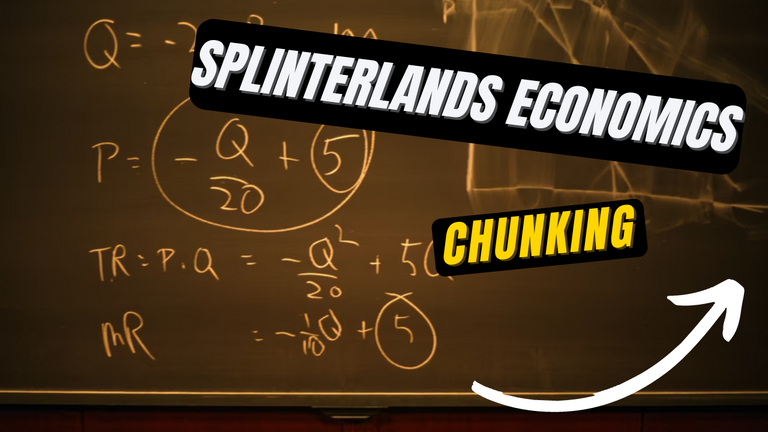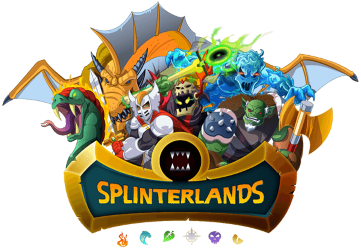Splinterlands Economics: Chunking
Hello everyone! We are back again today with another edition of Splinterland Economics - a series in which we introduce a basic economic concept and then apply it to Splinterlands. If this is your first time reading, just to tell you a little bit about myself: my day job is in an unrelated area but I consider myself a little bit of economics nerd - I read a little (or maybe way, way) more news than I should, double majored in econ, and am obsessed with optimization. I love the way Splinterlands is equal parts card game and resource allocation game. My goal with these articles is to share a little bit of what I know with you all.
Our subject today has to deal with the way we approach processing and acting on information. While it doesn't involve any math, it is just as important as the equations behind any optimization problem.
Utilizing it, consciously or not, can help us to retain information more easily and react more quickly to situations or new occurrences. Today, we'll be tackling another behavioral economic topic and talking about Chunking!

What is Chunking?
"Chunking" refers to the way in which we process and mentally arrange pieces of information. Specifically, the concept involves the way in which we group smaller pieces into a larger one, or a "chunk. Grouping numbers this way often makes it easier to remember them. For example, phone numbers tend to be separated into clusters of digits - in the United States at least it is a 3-3-4 format (e.g., ###-867-5309). It may be difficult to remember 9 separate numbers or 9 digits, but recalling 3 "chunks" is significantly easier for most people. If you have ever used a mnemonic device then that is another example of chunking by associating a list or series of terms with a single phrase, for example you may have learned "Dear King Philip Came Over For Good Soup" in a Biology class.

Chunking has multiple benefits. This first and most obvious one is that it allows us to more easily remember and recall larger amounts of information. Whether you are trying to remember a friend's phone number, your shopping list, or the order of all your country's respective leaders, chunking elements into slightly larger groups makes it easier to get those bits of data to stick in your head.
The second, and slightly related one, is that it allows us to remember and process that information FASTER. If you think of your mind as being similar to a computer, using chunking is effectively increasing your amount of RAM (high speed memory). And speed matters! One of the more interesting anecdotes that I've heard, possibly because it bridges my dual interested of economics, and engineering, is about the New York Stock Exchange - traders cared so much about how quickly they could receive information that that the exchange had to start making sure that the length of cable from the servers to each trader was the same. Regardless of whether this actually made a difference or not, the amount of hassle that the stock exchange went through to ensure fairness is a great example of the importance of speed.

Chunking is not limited to finance or remembering trivia, nearly any activity can use or apply chunking. There are applications in sports or gaming where "muscle memory" is another way of saying that a player or athlete has chunked a series of motions or control inputs. Whether it is in work or in play, there is a high chance that chunking can help your performance, or that you have already been doing it without even realizing it!
How do we apply it to Splinterlands?

Splinterlands has many instances in which we need to absorb and process information, and any situation where we are doing that is an opportunity for us to apply chunking in order to analyze a situation more quickly and determine the best course of action. Splinterlands is a card game in which there are not any mechanically difficult strategies or elements requiring fast reflexes. However, being able to think and remember faster is still to your benefit in many areas.
Are you playing ranked matches? You have a limited amount of time to look at the ruleset and your opponent's past lineups, and to set up your own monsters for battle. Being able to chunk rulesets into easily remembered combinations or monster groupings into general strategies can allow you to identify the best lineup to use more quickly. One way to apply chunking here is by learning to recognize common combinations of cards such as monsters that pair well with each other or with a particular summoner. Then when you see those combinations in a lineup you know which strategies to expect, or if you are setting your lineup then you can have some sets of cards that you can look to use.
Are you buying or selling cards on the marketplace? Being able to react to new developments by more quickly analyzing and determining which groups of assets or cards may be impacted by news can help you to be a step ahead of everyone else and get better prices. You can apply chunking here be learning about the ways in which the Splinterlands ecosystem is connected, and which sets of cards or other assets are affected by others. Then, when an event occurs which may affect values, you should be able to more easily identify which groups could be impacted.
Why should we care?

As you may imagine, being able to remember more and to be able to recall things more quickly can be immensely helpful in most parts of life. Both in Splinterlands and in your life outside of it, consciously using chunking will help you to be able to remember more, analyze situations faster, and make decisions more quickly. Want to improve at remembering the name of that person you just met or be able to break down a team composition in a single glance? While I can't guarantee results, applying chunking to the problem may dramatically increase your chances of success.
Thank you so much for reading all the way to the end. Interested in seeing some more of my writing in the future? Be sure to give me a follow! In the meantime, if you'd like to see some of my recent posts:
This One is a Little Unusual - Using Cruel Sethropod in Battle! - Last week's battle challenge, featuring Cruel Sethropod!
Splinterlands Economics: The 80/20 "Rule" - An introduction to the 80/20 rule, and how we can can apply it to Splinterlands.
Splinterlands Economics: Network Effects - An look into network effects, and how we can can apply them to Splinterlands.
Thinking about giving Splinterlands a try but haven't signed up yet? Feel free to use my referral link: https://splinterlands.com?ref=bteim, and be sure to reach out to me if you have any questions!
All images used in this article are open source and obtained from Pixabay or Unsplash. Thumbnails borrowed with permission from the Splinterlands team or made in Canva.
Thanks for sharing! - @marianaemilia

Nice writing and theme. Thanks for sharing!